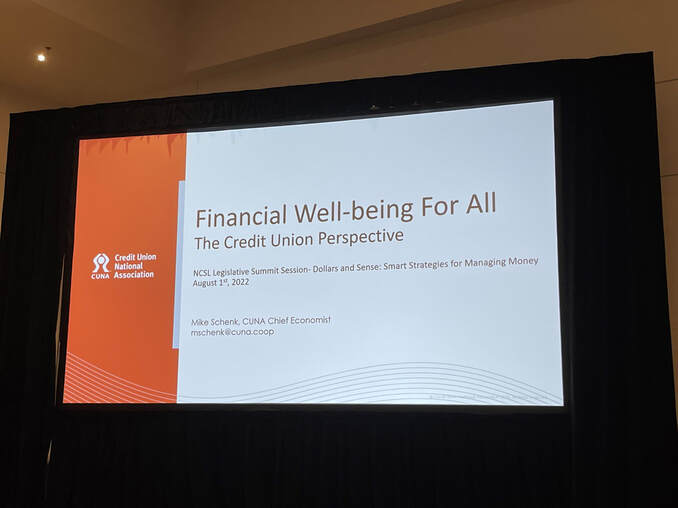|
by Jay Kruse, Chief Advocacy Officer Good morning! I am reporting live this week from Denver, CO, the host of this year’s National Conference of State Legislators, or NCSL as it is commonly referred to. I am here representing not only North and South Dakota credit unions, but America’s credit unions, along with a dozen or so other credit union advocates from CUNA and state associations from across the Midwest. America’s Credit Unions are one of the major sponsors of this event, supplying attendees with a credit union branded bag to carry around all their swag, in addition to sponsoring the conference Wi-Fi. The conference boasts a large exhibit hall, similar to the CUNA GAC, where our group of credit union advocates are working a booth to share how credit unions are working to improve financial well-being for all and serving constituents across the United States. With over 5,000 people in attendance this week, we have been busy! CUNA’s Chief Economist, Mike Schenk, did an amazing job representing credit unions on a three-person panel for the “Dollars and Sense: Smart Strategies for Managing Money” breakout session, explaining the many ways credit unions are supporting their communities, improving financial well-being for all, and the data that shows how successful our efforts have been. NCSL, founded in 1975, represents the legislatures in the states, territories, and commonwealths of the U.S. Its mission is to advance the effectiveness, independence, and integrity of legislatures and to foster interstate cooperation and facilitate the exchange of information among legislatures. The conference promotes cooperation between state legislatures in the U.S. and those in other countries.
CECL Update As many of you are aware, the current expected credit losses (CECL) methodology standard must be implemented for fiscal years beginning after December 15, 2022. By way of a recent accounting alert sent to federally insured credit unions, NCUA announced that a credit union’s CECL implementation begins the day after the date of its audited financial reporting year. NCUA previously interpreted "fiscal year" to mean "calendar year" – and for some credit unions, annual audits do not coincide with the calendar year end. For example, CECL must be implemented for fiscal years after December 15, 2022, so, a credit union with an audit year end as of March 31, 2023, can adopt CECL on April 1, 2023. For additional details, please consult the accounting alert sent by NCUA to your credit union. Additional information about CECL can be obtained from NCUAs CECL Implementation Resource page. As always, don’t hesitate to contact me with any advocacy or legislative questions. Comments are closed.
|
The MemoThe Memo is DakCU's newsletter that keeps Want the Memo delivered straight to your inbox?
Archives
July 2024
Categories
All
|
|
Copyright Dakota Credit Union Association. All Rights Reserved.
2005 N Kavaney Dr - Suite 201 | Bismarck, North Dakota 58501 Phone: 800-279-6328 | [email protected] | sitemap | privacy policy |






